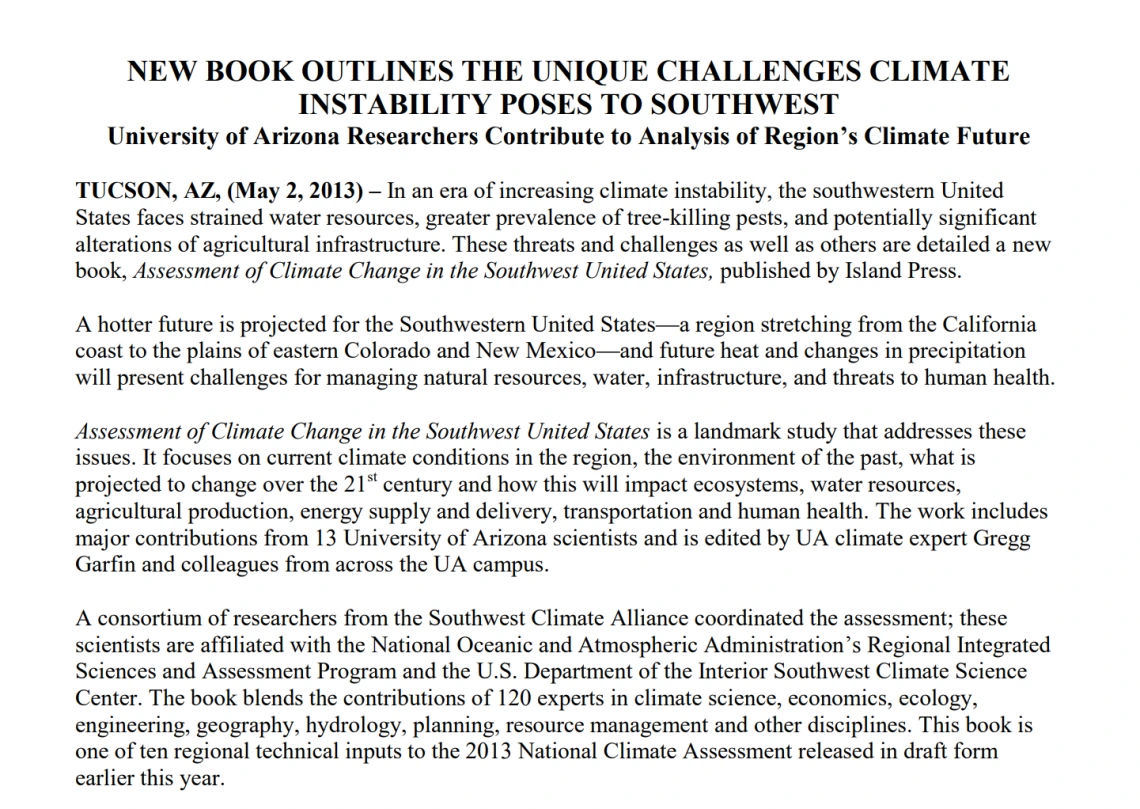University of Arizona Press Release

NEW BOOK OUTLINES THE UNIQUE CHALLENGES CLIMATE INSTABILITY POSES TO SOUTHWEST
University of Arizona Researchers Contribute to Analysis of Region’s Climate Future
TUCSON, AZ, (May 2, 2013) – In an era of increasing climate instability, the southwestern United States faces strained water resources, greater prevalence of tree-killing pests, and potentially significant alterations of agricultural infrastructure. These threats and challenges as well as others are detailed a new book, Assessment of Climate Change in the Southwest United States, published by Island Press.
A hotter future is projected for the Southwestern United States—a region stretching from the California coast to the plains of eastern Colorado and New Mexico—and future heat and changes in precipitation will present challenges for managing natural resources, water, infrastructure, and threats to human health.
Assessment of Climate Change in the Southwest United States is a landmark study that addresses these issues. It focuses on current climate conditions in the region, the environment of the past, what is projected to change over the 21st century and how this will impact ecosystems, water resources, agricultural production, energy supply and delivery, transportation and human health. The work includes major contributions from 13 University of Arizona scientists and is edited by UA climate expert Gregg Garfin and colleagues from across the UA campus.
A consortium of researchers from the Southwest Climate Alliance coordinated the assessment; these scientists are affiliated with the National Oceanic and Atmospheric Administration’s Regional Integrated Sciences and Assessment Program and the U.S. Department of the Interior Southwest Climate Science Center. The book blends the contributions of 120 experts in climate science, economics, ecology, engineering, geography, hydrology, planning, resource management and other disciplines. This book is one of ten regional technical inputs to the 2013 National Climate Assessment released in draft form earlier this year.
“According to our research, we are already witnessing the effects of climate change on snowmelt, and increased temperatures are strongly associated with increased wildfire risk, extensive forest mortality, and longer, more severe heat waves,” says Garfin, the book’s chief editor.
Besides Garfin, University of Arizona contributors include Heidi E.Brown, Chris Castro, Karletta Chief, Andrew Comrie, George B. Frisvold, Christina Greene, Eric Holthaus, Angela Jardine, Diana Liverman, Jonathan Overpeck, Joellen Russell, and Margaret Wilder. They contributed to chapters on human health, extreme climate, tribal challenges, agriculture, sustainability, and climate impacts on US and Mexico border communities.
The new book stresses the choices and opportunities available to society in order to reduce the causes and effects of climate change in the region. It notes the steps governments, businesses, organizations, and individuals are taking to improve energy efficiency, improve water supply reliability, decrease wildfire risk, and reduce greenhouse gas emissions.
Assessment of Climate Change in the Southwest United States is available from www.islandpress.org and at major retailers. The Assessment website http://www.swcarr.arizona.edu provides access to download full book chapters, short summaries of each chapter, and all graphics developed for the book.
About the Executive Editor Gregg Garfin is Assistant Professor and Assistant Extension Specialist in Climate, Natural Resources and Policy, in the University of Arizona’s School of Natural Resources and
the Environment. He is also Deputy Director for Science Translation and Outreach in the University’s Institute of the Environment. His work focuses on collaborative research among scientists, resource managers and decision-makers, in the areas of climate variability and change, drought, and adaptation to a changing climate. He is co-Convening Lead Author on the National Climate Assessment’s Chapter 20: Southwest.
Contact:
Gregg Garfin
Deputy Director for Science Translation & Outreach Institute of the Environment, University of Arizona gmgarfin@email.arizona.edu
(520) 591-9543
